Black History, Business
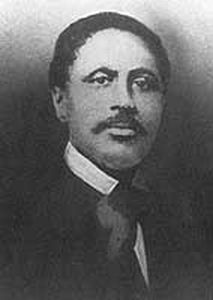
Macon Bolling Allen
Macon Bolling Allen is believed to be the first black man in the United States who was licensed to practice law. Born Allen Macon Bolling in 1816 in Indiana, he grew up a free man. Bolling learned to read and write on his on his own and eventually landed his first a job as a schoolteacher where he further refined his skills.
In the early 1840s Bolling moved from Indiana to Portland, Maine. There he changed his name to Macon Bolling Allen and became friends with local anti-slavery leader General Samuel Fessenden, who had recently began a law practice. Fessenden took on Allen as an apprentice/law clerk. By 1844 Allen had acquired enough proficiency that Fessenden introduced him to the Portland District court and stated that he thought Allen should be able to practice as a lawyer. He was refused on the grounds that he was not a citizen, though according to Maine law anyone “of good moral character� could be admitted to the bar. He then decided to apply for admission by examination. After passing the exam and earning his recommendation he was declared a citizen of Maine and given his license to practice law on July 3, 1844.
(more…)
Black History, Politics
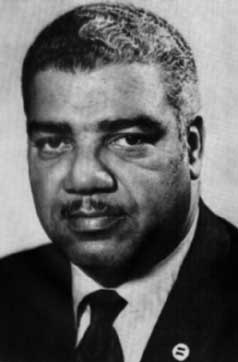
Whitney Moore Young
A civil rights leader who urged African Americans to work within the system, Whitney Moore Young, as executive director of the National Urban League from 1961 to 1971, played a leading role in persuading America’s corporate elite to provide better opportunities for African Americans.
Young worked with President Lyndon Johnson on civil rights and anti-poverty programs during the 1960s, while calling for a “domestic Marshall Plan” (similar to U.S. aid to revive Europe after World War II).
He was one of the leaders of the 1963 March on Washington and in 1964 he organized the Community Action Assembly to fight poverty in African-American communities. He was awarded the Medal of Freedom, the nation’s highest civilian honor, in 1969.
Two years later at the age of 49, Young drowned in Lagos, Nigeria while participating in an annual African-American dialogue on relations between the two continents.
Black History, Publishing
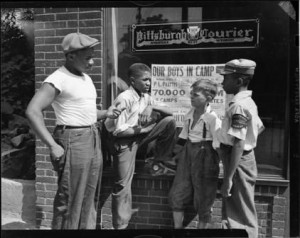
Four boys outside Courier
The Pittsburgh Courier was established in 1907 by Edwin Harleston, a security guard and writer. The newspaper gained fame after Robert Lee Vann took over the paper in 1910 and eventually became the nations most widely circulated black newspaper at almost 200,000.
The Courier was always an organ for the wellbeing of the average African-American. It would call for housing improvements and the opening of black hospitals. The Pittsburgh Courier also sought to improve the black peoples’ financial and political skills. (more…)
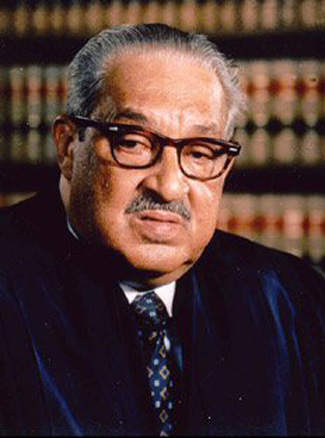
Black History, Law

Thurgood Marshall
Born in Baltimore, Maryland on July 2, 1908, Thurgood Marshall was the grandson of a slave. His father, William Marshall, instilled in him from youth an appreciation for the United States Constitution and the rule of law. After completing high school in 1925, Thurgood followed his brother, William Aubrey Marshall, at the historically black Lincoln University in Chester County, Pennsylvania.
His classmates at Lincoln included a distinguished group of future Black leaders such as the poet and author Langston Hughes, the future President of Ghana, Kwame Nkrumah, and musician Cab Calloway. Just before graduation, he married his first wife, Vivian “Buster” Burey. Their twenty-five year marriage ended with her death from cancer in 1955. (more…)
Black History, Slavery
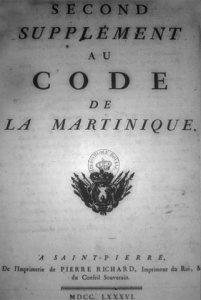 On 4 February 1794, the First Republic (Convention) voted for the abolition of slavery in all French colonies. The abolition decree stated that “the Convention declares the slavery of the Blacks abolished in all the colonies; consequently, all men, irrespective of colour, living in the colonies are French citizens and will enjoy all the rights provided by the Constitution.”
On 4 February 1794, the First Republic (Convention) voted for the abolition of slavery in all French colonies. The abolition decree stated that “the Convention declares the slavery of the Blacks abolished in all the colonies; consequently, all men, irrespective of colour, living in the colonies are French citizens and will enjoy all the rights provided by the Constitution.”
Restored by the Consulate in 1802, slavery was definitively abolished in 1848 by the Second Republic, on Victor Schoelcher’s initiative.




